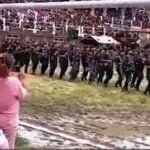Imphal/ August 14, 2023 (SPN) | In a bold declaration, the proscribed Kangleipak Communist Party (KCP) has vehemently refuted the existence of the purported “Anglo-Kuki War.”
The KCP asserts that this term, newly coined and surfacing in recent times, is a deliberate distortion concocted to legitimize the devious schemes of divisive communal factions and narco-terrorist elements lurking within Kangleipak.
It can be concluded that “Anglo-Kuki War” is a freshly minted term arising out of the need for the Kuki Zo community to invent a historical excuse for grabbing the land of other communities rather than any reliable academic research
These malevolent narco-terrorist groups, in cahoots with divisive communal forces, have cunningly employed pseudo-intellectuals to weave a web of false historical narratives. Their targets have included Kangleipak at large and specifically the Kuki Zo community.
At the heart of this manufactured deception lies the baseless tale of the so-called “Anglo-Kuki War” of 1917-1919. This glaring falsehood, a creation of these pseudo-intellectuals, aims to implant fabricated elements into the revered annals of Kangleipak’s recorded history.
A press statement from the KCP’s Information and Public Relations Department Deputy Secretary, M Punsiba Meitei, reveals that exhaustive research into the alleged “Anglo-Kuki War” was conducted under the guidance of Politburo Standing Committee Chairman Ibungo Ngangom. The comprehensive research found that there is no mention at all of anything called the “Anglo-Kuki War” anywhere in the records of the UK National Archives.
Instead, an abstract from “the proceedings of the Chief Commissioner of Assam,” 1920, found in the British Library, makes fleeting mention of a “Kuki Rising.”
The term “Anglo-Kuki War” only emerged online on August 16, 2017, as it was introduced in an article by Scroll.in. This timeline, unequivocally, underscores the term’s novelty and its utility as a historical pretext for the Kuki Zo community’s territorial ambitions.
The saga of the so-called “Anglo-Kuki War” saw its first publication in the book “The Anglo-Kuki War 1917-1919: A Frontier Uprising Against Imperialism During the First World War,” released by Taylor and Francis in August 2018. Editors Jangkhomang Guite and Thongkhomang Haokip presented this perspective.
Even earlier, on January 1, 2013, the book “Anglo-Kuki Relationship from 1849 to 1937 and Other Essays” by Thangkhomang S Gangte, edited by Priyadarshni M Gangte, was published by Ruby Press & Co. This work refers to the contested event as the “Kuki Rebellion.”
A grave concern arises from the thriving narco-terrorism within Kangleipak’s Kuki-dominated hills. Politically influential figures of questionable origin offer patronage to these elements, demanding a resolute response from the KCP.
Condemning the unregulated narcotics trade as a crime against humanity, the KCP pledges to combat it with unwavering determination, irrespective of factors such as community, religion, caste, or gender.
In light of the looming threat, the KCP initiates a basic military training program for a Special Tactical Militia Unit. Named the Sigma Batch, these compatriots of Kangleipak will safeguard its territorial integrity through defensive military tactics and unwavering discipline.
On a solemn occasion, during the Sigma Batch’s passing-out ceremony, coinciding with Kangleipak’s Patriots Day, cadets solemnly vow to protect their land’s sanctity under all circumstances, even pledging the ultimate sacrifice.
In a poignant tribute, fallen heroes who laid down their lives for Kangleipak are honored, their memory preserved with tender petals of respect.
In the face of unprecedented brutalities inflicted by narco-terrorist entities and armed Kuki Zo groups, the Kangleipak Communist Party, led by Chairman Sir Ibungo Ngangom, is resolute.
Special tactical operations will be launched to neutralize these threats, safeguarding Kangleipak from an existential crisis.

Signpost News is an Imphal-based media house that focuses on delivering news and views from Northeast India and beyond.

